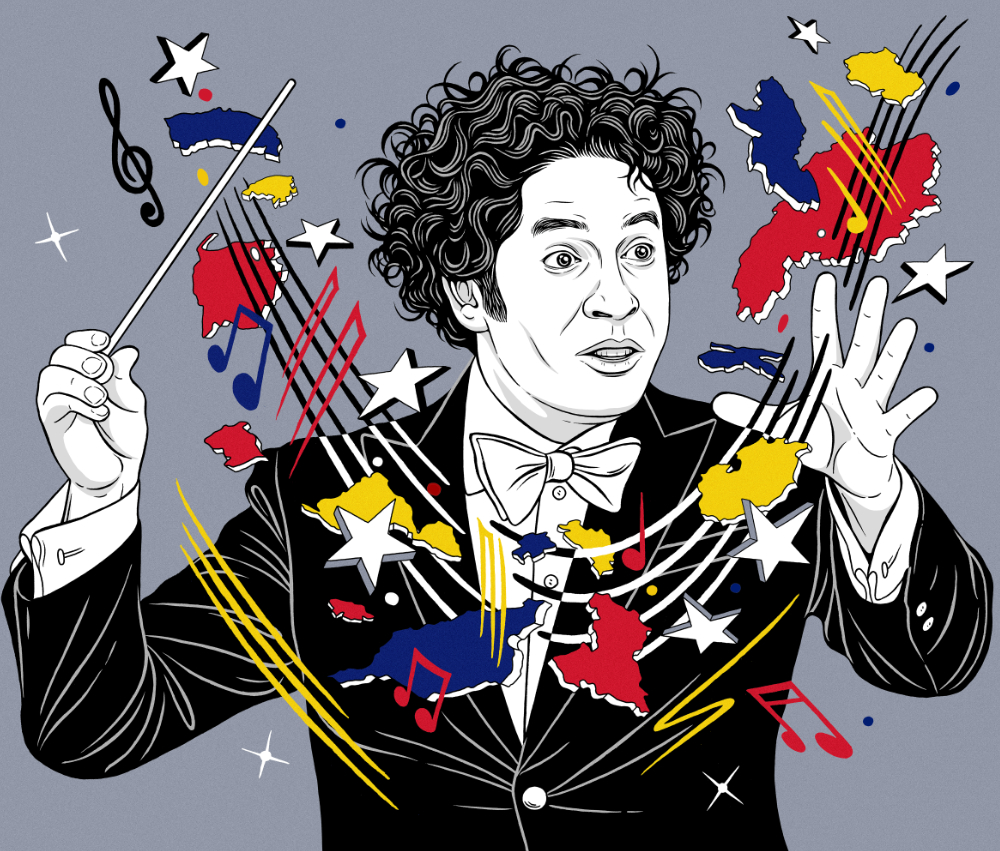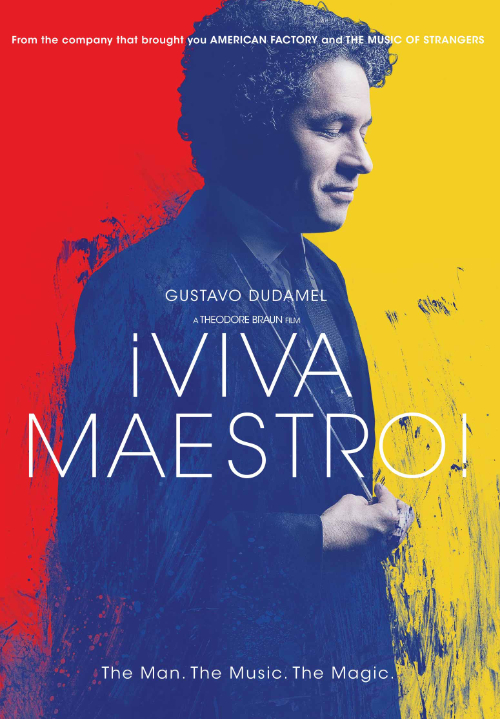
Classical musicians aren’t typically mobbed for autographs and selfies, but that’s exactly what happens to the subject of Theodore Braun ’82’s lively documentary ¡Viva Maestro!. Braun’s movie follows superstar conductor Gustavo Dudamel, whom one interviewee likens to Mick Jagger, over the course of about a year and a half, beginning in February 2017. It’s unlikely that Braun anticipated the upheaval he would be chronicling when he set out to profile Dudamel, a Venezuelan native who has been the music director of the Los Angeles Philharmonic since 2009.
After an introductory montage, the movie begins with Dudamel in Caracas, preparing for a tour with the Simón Bolívar Symphony Orchestra, with ominous onscreen titles indicating that this is the last time he will be in Venezuela for three years. Already, Dudamel and other musicians are talking about the country’s instability, which only grows worse over the course of the movie. Like Dudamel himself, ¡Viva Maestro! starts out as nonpolitical, until the political reality becomes unavoidable.

¡Viva Maestro!
Written and directed by Theodore Braun ’82
Produced by Dean Schramm ’84
Participant Media/Greenwich Entertainment
Streaming on HBO Max in December
The economic crisis under President Nicolás Maduro reaches a breaking point that disrupts daily life, with shortages of essential goods and frequent street protests that threaten to erupt into violence. Braun uses news headlines to establish the gravity of the situation, but he doesn’t go into detail about political conflicts or market forces. Instead, he makes the stories personal, as when a musician who performs with Dudamel describes the heartbreaking ordeal of attempting to acquire necessary vaccines for his young daughter.
Braun has taken on serious social issues in his previous documentaries Darfur Now and Betting on Zero, so he’s well-equipped to handle the shift as Venezuelan politics becomes more alarming and dangerous. Dudamel, who’s been reluctant to speak out against the country’s leadership, eventually makes a public statement condemning violence. The government in Venezuela immediately retaliates, canceling his international tours with both the Simón Bolívar Symphony and El Sistema, the youth orchestra that has been his lifelong passion. Dudamel essentially goes into exile in Los Angeles and other cities.
Braun makes the gravity of the political situation clear without it overtaking his artistic portrait, and Dudamel argues convincingly for the value of art in the most volatile times. Even when making his voice heard on political issues via a New York Times op-ed opposing the Maduro government’s plan to draft a new constitution, Dudamel never strays from his dedication to music, especially to the young musicians coming up through El Sistema, a program that he himself participated in as a child.
Braun keeps the music at the center of the story, using simple, effective graphics to illustrate the effect of political instability on musicians in Venezuela, who quit their orchestra positions and leave the country in escalating numbers. When he himself moves out, Dudamel makes sure to check in with his Venezuelan colleagues, recruiting them to perform with him abroad or conducting rehearsals over video chat. It’s amusing to see Dudamel’s phone battery die in the middle of an inspirational talk he’s attempting to deliver to musicians on another continent, but it’s also a heartbreaking representation of his predicament.
Neither Dudamel nor Braun shies away from that heartbreak, but in the face of tragedy, ¡Viva Maestro! is ultimately uplifting. Dudamel is a marvel to watch as he conducts like a man possessed, his signature curly hair flying as his arms flail, justifying his rock-star reputation. The way that he directs an orchestra to rehearse just the first four notes of Beethoven’s Symphony No. 5, over and over, demonstrates an approach that’s both precise and intuitive. Multiple times, Braun seamlessly cuts from Dudamel in rehearsal to Dudamel in performance within the same piece, and his consistent energy is infectious. Even viewers who know nothing about classical music should come away from ¡Viva Maestro! with an appreciation for Dudamel’s talent and the compositions that inspire him.
Bell is a writer and critic based in Las Vegas.
Illustration by Stuart Patience